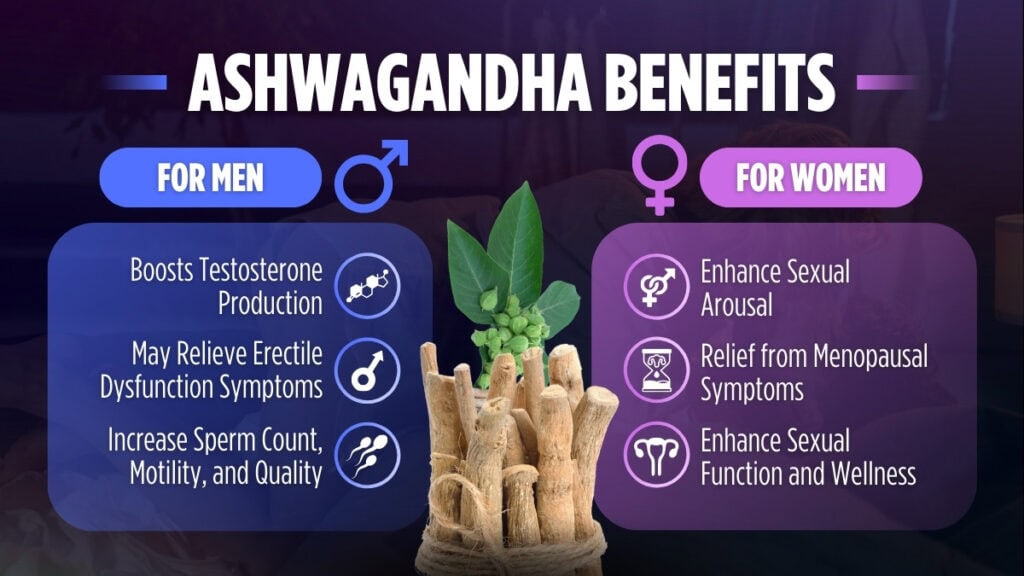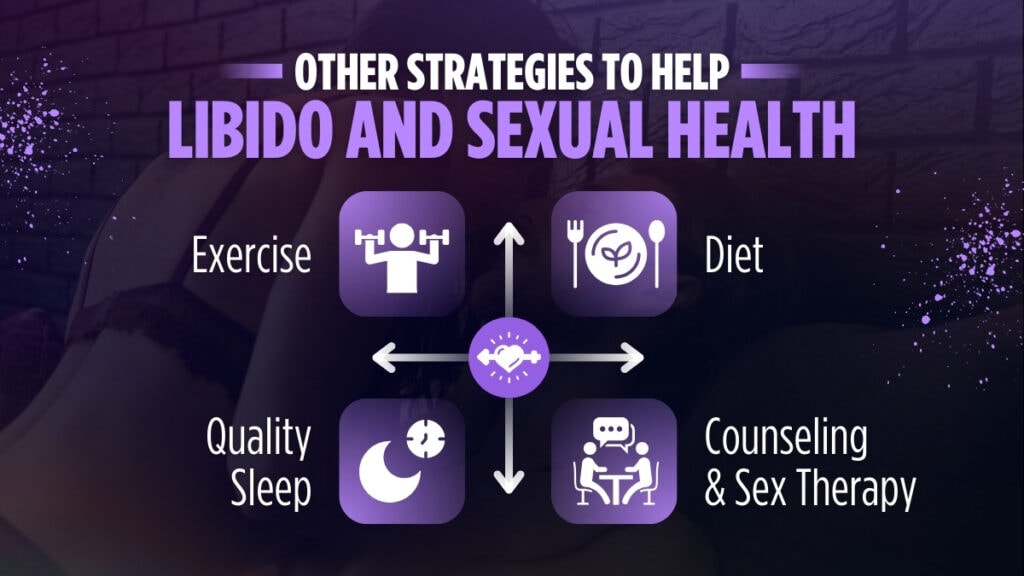
Ashwagandha has garnered attention for its positive effects on stress management, sexual and mental health, and the immune system. Due to these benefits, it has become a popular supplement for many.
Ashwagandha affects sexual health in several ways. And while this guide investigates whether ashwagandha improves sex drive, we will also discuss its other benefits for men and women and its potential side effects.
We’ll provide comprehensive answers for those who’ve been asking, “Does ashwagandha make you horny?” Let’s start!
What Is Ashwagandha?
Ashwagandha, or Withania somnifera, is an herb that originated in Ayurvedic medicine. It has been used for thousands of years to promote vitality and reduce stress, and it is renowned for its ability to help regulate cortisol levels [1].
More recently, ashwagandha has found its purpose and gained widespread popularity in sexual health and hormonal balance. Many experts argue that its multifaceted effects on mental, physical, and emotional wellness can help with libido and enhance intimate experiences [2].
The buzz surrounding it stems from an impressive range of bioactive compounds, including withanolides, alkaloids, and flavonoids. Ashwagandha is often recommended to help balance hormones, improve circulation, and support reproductive health.
What Is Behind Ashwagandha’s Effects on Libido?
So, what does ashwagandha do for libido? Its potential to boost libido and sexual health lies in adaptogenic properties as well as hormone regulation and stress relief. We all know stress and anxiety can play a significant role in diminishing sexual desire and performance, and ashwagandha plays right into this, targeting both the physical and mental aspects of intimacy.
By reducing cortisol levels, ashwagandha can create a hormonally balanced environment to support healthy sexual function [3]. Aside from improving mood and consequently reducing performance anxiety, it directly impacts key hormones like testosterone and estrogen.
The antioxidant properties enhance this impact by improving blood flow and cell function. These combined effects can further boost sexual desire but also contribute to better stamina, fertility, and satisfaction.
Ashwagandha and Sexual Desire
Ashwagandha is celebrated for its aphrodisiac properties. Younger users report experiencing more desire, enhanced sensitivity, and arousal [4]. It supports hormonal equilibrium in men and women, while reduced stress can remove psychological barriers to intimacy. This often makes space for a more relaxed and pleasurable experience.
Hormonal Balance
Hormonal imbalances are one of the most notable underlying reasons for low libido, erectile dysfunction, and irregular menstrual cycles. Ashwagandha supports endocrine function, helping stabilize hormone levels and promote reproductive health. By regulating cortisol and improving thyroid function, ashwagandha indirectly supports the production of sex hormones.
Does Ashwagandha Increase Testosterone?
Ashwagandha is not a testosterone booster, and studies have shown a stable increase in T levels with supplementation [5]. This is especially true for men dealing with stress, and this increase in testosterone can improve libido, enhance muscle growth, and even boost energy levels.
Ashwagandha Benefits for Men
Testosterone regulation is one of the key benefits of ashwagandha in men, but it’s just the tip of the iceberg. Let’s take a closer look!

Effect on Testosterone Levels
Ashwagandha is found in many supplements that naturally boost testosterone, and T levels play a central role in male sexual health. We’ve already noted this is particularly important for men experiencing stress-induced imbalances, influencing not just libido but also muscle mass, energy, and stamina.
Additionally, ashwagandha enhances luteinizing hormone (LH) levels, stimulating testosterone production in the testes [4]. Its antioxidant properties protect testicular health by combating oxidative stress, which may preserve sperm quality and maintain reproductive function.
Ashwagandha’s Potential for Relief of ED Symptoms
Erectile dysfunction (ED) is often linked to stress, poor circulation, and hormonal imbalances. Ashwagandha may reduce anxiety and stress, which addresses one of the primary psychological causes of ED. Additionally, it may support longer-lasting erections through improved blood flow.
Its role in supporting cardiovascular health further contributes to better sexual performance. For men struggling with ED, ashwagandha offers a natural alternative to pharmaceutical treatments and a solid place to start treatment.
Effect on Sperm Count and Motility
Ashwagandha is a traditional medicine with a history of use in male fertility, increasing sperm count, motility, and quality. Ashwagandha supplements can significantly improve these parameters, which are attributed to the compound’s antioxidant properties.
Furthermore, ashwagandha’s stress reduction effect may help because poor sperm health is often related to stress. Lowering cortisol levels creates a more favorable hormonal environment for production, opening a way to improve fertility and sexual performance.
Ashwagandha Benefits for Women
Does ashwagandha make you less horny if you’re a woman? Certainly not, but let’s discuss why women take it!
Effects on Sexual Arousal
Ashwagandha is equally beneficial for women when you aim to enhance sexual arousal and sensitivity. It works the same as it reduces stress and promotes relaxation to make it easier for women to achieve arousal.
By improving blood flow to erogenous zones and balancing estrogen levels, ashwagandha supports a healthier sexual response. Many women also report improved lubrication and increased pleasure, whether it’s for elevated mood or just boosted energy levels that enhance sexual experiences.
Impact on Menopausal Symptoms
Ashwagandha can provide much-needed relief from menopause symptoms that negatively impact sexual health. Menopause often brings hormonal fluctuations, leading to decreased libido, vaginal dryness, and mood swings. Ashwagandha’s adaptogenic properties help stabilize hormones and reduce hot flashes, night sweats, and fatigue [6].
Its anti-inflammatory effects also ease joint pain and discomfort, which are common during menopause. By addressing both hormonal and physical challenges, ashwagandha can support overall well-being and women’s health during menopause.
Sexual Wellness and Female Sexual Function
Ashwagandha’s ability to enhance sexual function in women extends beyond arousal and managing menopause symptoms, though. It improves sexual wellness by increasing energy and reducing fatigue. Women often also experience increased sensitivity and responsiveness, making their intimate experiences more fulfilling.
Studies suggest that ashwagandha can improve orgasm frequency and satisfaction, making it a holistic option addressing hormonal imbalances, stress, or physical discomfort [7].
Ashwagandha Side Effects
Below, we explore common side effects of ashwagandha and discuss what you can expect.
Gastrointestinal Discomfort
It’s important to note that ashwagandha is generally well-tolerated, but some people experience adverse effects, especially early on. Gastrointestinal issues, including nausea, upset stomach, and diarrhea, are most common.
These effects often arise when ashwagandha is taken on an empty stomach or in higher doses. Bioactive compounds can irritate the stomach lining, leading to digestive discomfort. To try and avoid such side effects, start with a lower dose and take ashwagandha with food or a glass of milk to allow your body to adjust to it.
Lastly, you want to drink plenty of water and maintain proper hydration, which supports digestion and helps prevent stomach upset. Consult a healthcare provider if you are prone to such issues or if the symptoms persist.
Drowsiness
Ashwagandha’s calming effects can sometimes lead to drowsiness or excessive sedation. Avoid taking high doses and consult a doctor to combine it with meds or other supplements. If you still experience drowsiness, take ashwagandha in the evening and closely monitor dosage.
Possible Hormonal Imbalances
While often beneficial, ashwagandha’s influence on hormone levels can sometimes lead to imbalances. In men, this can result in irritability, acne, or aggression. Meanwhile, women can see changes in menstrual cycles or exacerbated symptoms of hormonal disorders like polycystic ovary syndrome (PCOS).
To minimize the risk of hormonal imbalances, stick to recommended dosages and consider periodic hormone level testing. Avoid taking supplements if you are pregnant or breastfeeding, or at least consult your doctor before starting any.
Stress and Its Role in Sexual Health: How Can Ashwagandha Help?
Let’s focus on stress, how it affects sexual health, and how ashwagandha can help below.
Cortisol’s Suppressive Effect on Libido
We’ve already mentioned how chronic stress leads to elevated cortisol levels, which can suppress libido and impair sexual performance. However, high cortisol also disrupts the balance of other hormones, such as testosterone and estrogen, making it harder to maintain healthy sexual function.
Additionally, stress reduces dopamine and serotonin levels, further dampening mood and sexual desire. Over time, this hormonal imbalance can lead to fatigue, anxiety, and low self-esteem. Ashwagandha effectively reduces cortisol levels, helping the body return to a balanced hormonal state.
Mental Health and Sexual Desire
Mental health plays a significant role in sexual desire. Stress-related anxiety and depression often significantly diminish intimacy, whereas emotional distress creates psychological barriers. For many people, performance anxiety further compounds stress, which can result in a vicious circle.
Ashwagandha enhances mood and has adaptogenic properties that support mental health and emotional balance, making it a common ingredient in nootropics. It reduces anxiety symptoms and helps users feel more relaxed. This stability allows us to enjoy intimate moments without distractions.
Stress and Sexual Performance
Increased heart rate and muscle tension are often intertwined with stress, which makes it even harder to perform in bed. This affects arousal and erectile function. For women, stress can go as far as causing vaginal dryness and reduced sensitivity, leading to discomfort.
Ashwagandha counters these effects by improving circulation and relaxing blood vessels. It often allows for better blood flow, which is essential for arousal and performance [7].
How Ashwagandha Can Help
Ashwagandha’s multifaceted effects make it a powerful tool for enhancing sexual health. Here a four ways the herb can improve your sexual well-being
- Ashwagandha helps balance neurotransmitters like serotonin and dopamine, improving mood and providing calming effects.
- Aside from reducing cortisol, ashwagandha boosts testosterone and estrogen, which support hormonal balance and directly result in libido and fertility.
- By addressing both the psychological and physical effects of stress, ashwagandha provides a holistic approach to sexual health, which is particularly practical for people whose sex lives are affected by high-pressure lifestyles or burnout.
- Additionally, ashwagandha’s hormonal and vitality effects are well documented, and it is a confidence booster for both men and women.
Other Strategies to Help Improve Libido and Sexual Health
Ashwagandha is not the only way to increase your libido and improve your sexual performance. Here are some critical considerations that can help improve your sexual health:

Diet
You should eat a balanced diet rich in vitamins, minerals, and antioxidants. Many diet programs emphasize these nutrient-rich foods. Nutrients like zinc, magnesium, and vitamin E primarily support hormone production and circulation, which are vital for libido.
Leafy greens, berries, nuts, and seeds also provide antioxidants that combat oxidative stress and enhance reproductive function. Try aphrodisiac foods like dark chocolate, oysters, and avocados to boost libido by stimulating neurotransmitters and promoting blood flow.
Maintain hydration, avoid processed foods, and keep off sugar and alcohol if trying to fix your hormonal balance and energy levels. These measures are bound to create a foundation for better sexual health.
Exercise
Regular exercise, especially within a structured workout program, boosts libido by improving blood flow and reducing stress. Cardio exercises like running and swimming promote circulation, while strength training supports testosterone production.
Exercise releases endorphins, which may help elevate mood flow, so make it a regular part of your routine to maintain sexual vitality and confidence and improve overall health.
Quality Sleep
Sleep is essential for hormone regulation, mood stability, and energy. Poor sleep can disrupt hormone production, leading to testosterone and cortisol imbalances. Inadequate rest also increases stress and fatigue, reducing interest in intimacy.
Try to have 7 to 9 hours of quality sleep each night to improve hormone balance and work on your mental health. If you’re having trouble, consider establishing a bedtime routine, limiting your screen time before bed, and avoiding caffeine late in the day.
You can also try magnesium supplements, whether glyci͏nate or citr͏ate, to help reduce stress and anxiety that may be affecting your sleep.
Counseling and Sex Therapy
Underlying mental health issues, such as anxiety, depression, or past trauma, may require counseling or sex therapy. These can provide you with tools for communication, stress management, and emotional bonding, ultimately improving sexual satisfaction.
Couples therapy can also strengthen relationships by fostering understanding and intimacy. Consider professional help if you’re struggling to identify triggers or develop strategies that work in the bedroom.
Expert Insights
Ashwagandha’s potential influence on sexual health is a topic of expert interest. For women, an article reviewed by Imashi Fernando (a registered dietitian nutritionist) suggests that ashwagandha’s aphrodisiac qualities may contribute to overall sexual enhancement.
This effect, the review proposes, might be partly attributed to ashwagandha’s ability to improve mood and alleviate stress. The article also praises ashwagandha as a potential addition to a broader wellness approach, alongside therapies, lifestyle adjustments, and other herbal remedies [8].
Matthew Wosnitzer, a board-certified urologic surgeon, medically verified a separate piece that explored ashwagandha’s benefits in areas ranging from sex drive to mental health. This review concludes that ashwagandha may offer advantages for men, such as boosting testosterone and improving sperm count and quality [9].
However, the article also clarifies that ashwagandha’s abilities to treat erectile dysfunction, manage diabetes, or reverse the signs of aging are less specific [9].
FAQs on Ashwagandha and Libido
Below, we address some of the most commonly asked questions about ashwagandha and its effects on libido, besides the frequent question people ask: “Does ashwagandha make you horny?”
Does Ashwagandha Make You Last in Bed?
Ashwagandha may help improve sexual stamina indirectly by addressing key factors that impact performance. It addresses stress and anxiety as psychological barriers that often lead to decreased performance. Additionally, ashwagandha can support testosterone production, which contributes to improved libido and arousal.
Does Ashwagandha Make You More Fertile?
Ashwagandha is often taken to address fertility issues, particularly by men. It has excellent potential to help sperm quality and testosterone levels. For women, ashwagandha may enhance fertility by promoting hormonal balance and regulating menstrual cycles. Stress is a significant barrier to conception, and its adaptogenic properties help alleviate this obstacle.
What Happens When a Woman Takes Ashwagandha?
When women take ashwagandha, they may experience improvements in hormonal balance, stress reduction, and improved energy levels. Its adaptogenic properties help regulate the hypothalamic-pituitary-adrenal (HPA) axis, which influences the production of estrogen and progesterone.
How Long Does It Take for Ashwagandha to Kick in?
Some effects, like stress reduction, might be noticeable within a few weeks, while others, like hormonal changes, may take a few months of consistent use. It varies, but don’t expect instant results.
Does Ashwagandha Make You Lose Weight?
Yes, but indirectly. Its stress-reducing properties can help manage cortisol levels, which are linked to fat storage, and it may improve energy and sleep, both crucial for a healthy lifestyle. However, don’t expect dramatic weight loss from ashwagandha alone; it works best alongside a balanced diet and regular exercise.
Final Thoughts
Ashwagandha is promising as a natural aid for enhancing libido and sexual health. It can balance hormones, reduce stress, and improve vitality and desire.
So, does ashwagandha make you horny? Perhaps it can play a supportive role, but it’s not a simple yes or no. It’s a popular choice for a reason, but make sure to choose high-quality ashwagandha products from reputable brands and always consult a healthcare provider before trying them out.
The key takeaway is approaching this herb with informed curiosity and prioritizing your overall well-being.
 11 Niche Experts
11 Niche Experts
 100+ Product Reviews
100+ Product Reviews
 50+ Tested Products
50+ Tested Products
At BestDaily, our mission is simple: to help you make confident, informed decisions about the products that impact your daily life. Whether you're searching for wellness essentials or lifestyle upgrades, we combine hands-on testing with expert analysis to highlight what truly works.

